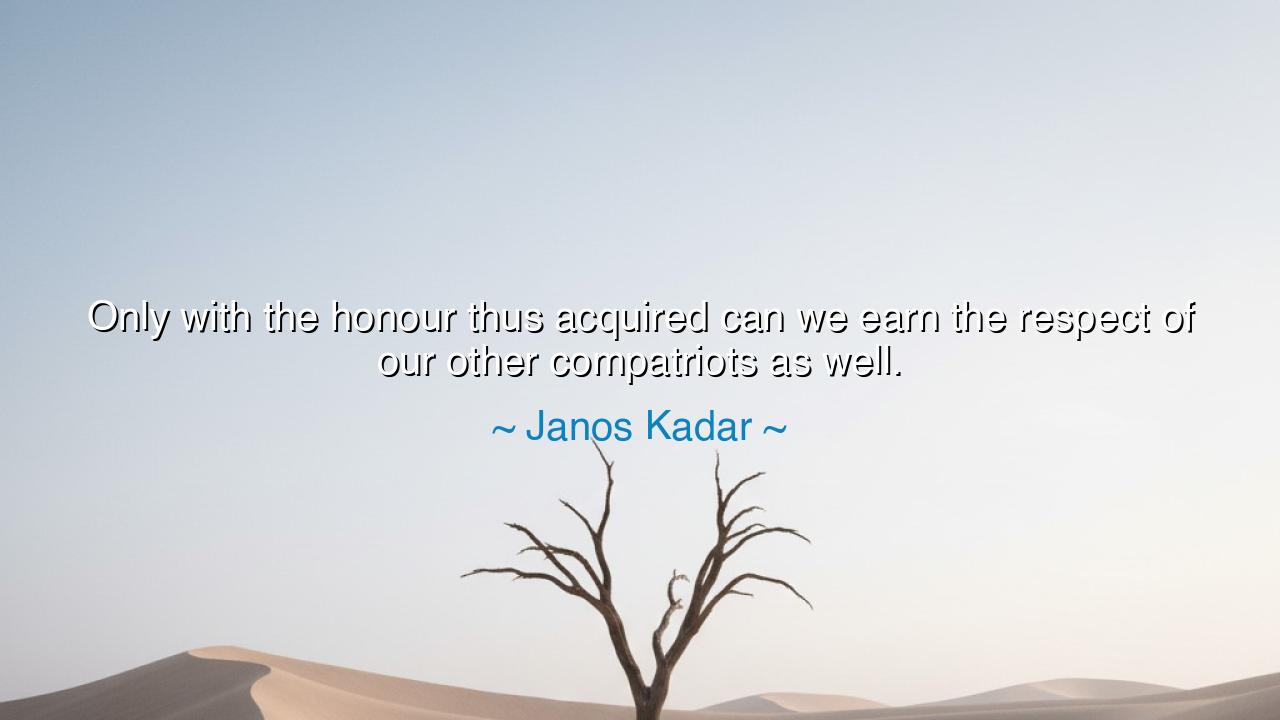
Only with the honour thus acquired can we earn the respect of our
Only with the honour thus acquired can we earn the respect of our other compatriots as well.






Hear, O heirs of destiny, the words of János Kádár, who spoke with gravity: “Only with the honour thus acquired can we earn the respect of our other compatriots as well.” In this saying is revealed the eternal truth that honour is the first foundation of respect, and that no man or nation may hope to be esteemed by others until he has first proven himself worthy. For respect is not demanded—it is earned, and it is born only from deeds marked by dignity, sacrifice, and integrity.
The meaning of these words is clear: before we seek the applause of others, we must labor to cultivate our own honour. Respect between compatriots, between fellow citizens, does not spring from titles or positions, but from actions that reveal courage and loyalty. It is not through boastful claims that respect is won, but through the steady accumulation of trust, built day by day in the fires of trial. A nation, too, cannot command unity by decree alone; it must forge it by showing its people that its deeds are worthy of admiration.
Consider, my children, the tale of George Washington after the American Revolution. When victory was won, many whispered that he might take the crown and rule as king. Yet he refused power, surrendering command to the people and returning to his farm. By this act of honour, he won more than victory on the battlefield—he won the eternal respect of his compatriots, who saw that he served not for ambition, but for duty. His example became a cornerstone of trust, binding a young nation together in reverence for his character.
The origin of Kádár’s words must be understood in the soil of his time. As leader of Hungary during turbulent years, he knew well that a divided people cannot stand. He recognized that respect among compatriots is not automatic; it arises only when citizens see their leaders and their neighbors acting with honour. His statement carries the weight of history’s lesson: unity cannot be forced by fear, nor can loyalty be bought—it must be earned through deeds that inspire reverence.
Let us not mistake his words as pertaining only to rulers. No—this wisdom belongs to every man and woman. In the home, in the workplace, in the nation, the principle is the same: if you desire respect, first cultivate honour. Show fairness, keep your word, sacrifice when duty calls, and carry yourself with integrity. Then, and only then, will others look upon you with admiration. For the esteem of others is the reflection of your inner virtue made visible.
The lesson is bright as the sun: respect cannot be seized, it must be bestowed—and it is bestowed only upon those who act with honour. Do not waste your life chasing the fleeting approval of others; instead, root yourself in virtue, and respect shall follow as the shadow follows the body. When a people or a nation lives by this truth, it binds its members together with cords of trust, unbreakable by storm or strife.
Practical actions lie before you: speak truth, even when lies would profit; honor your commitments, even when they cost you; treat others with fairness, even when they are weak. Do not demand respect, but live in such a way that it cannot be withheld. And in your nations, hold leaders accountable to the same principle: let them earn the respect of the people through deeds of justice, not mere words.
Thus, O children of the future, let Kádár’s words echo in your souls: only with honour can respect be won. Live, therefore, as men and women of honour, and you shall be remembered not only by your compatriots, but by generations yet unborn. For honour is the seed, respect the fruit, and together they form the tree of unity upon which nations and lives may flourish.






AAdministratorAdministrator
Welcome, honored guests. Please leave a comment, we will respond soon